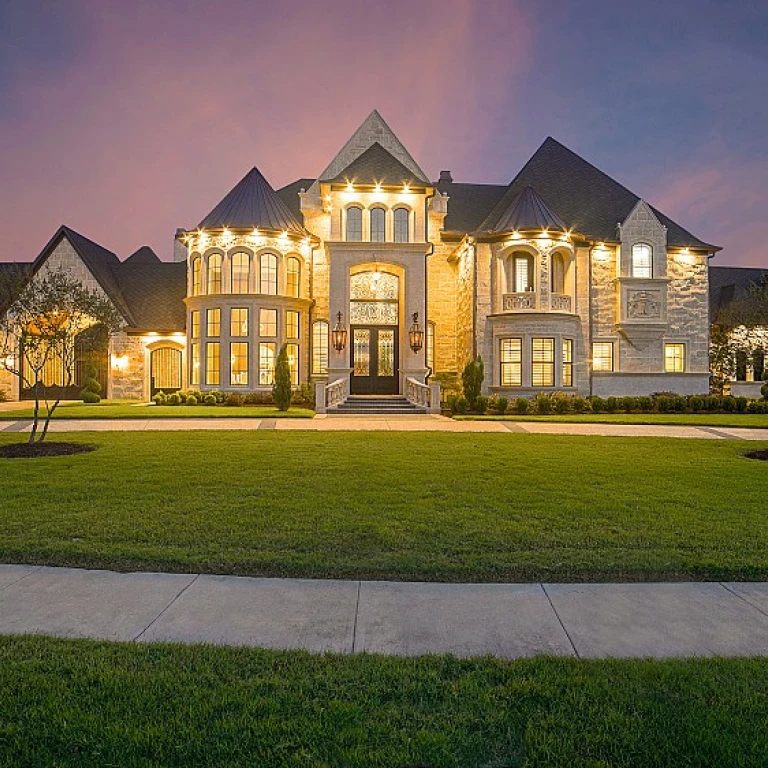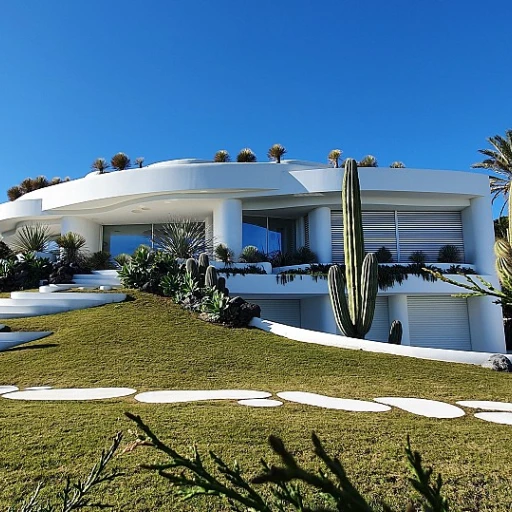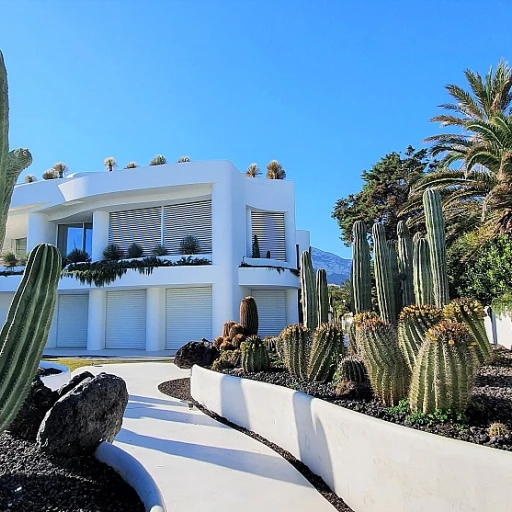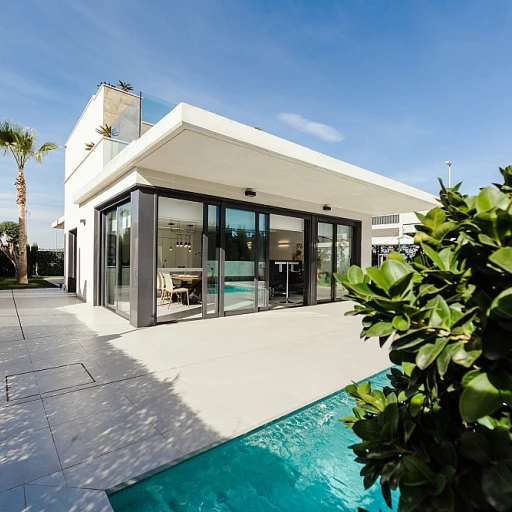Understanding the luxury real estate market
Getting a grasp on the opulent property market
Luxury real estate isn't just about acquiring a place to live; it's an investment in a lifestyle, often yielding substantial returns. Let's get started with some key insights and figures. As per the National Association of Realtors, the median price of luxury homes in the U.S. has increased by 4.1% year-over-year since 2018. This segment's growth is driven by high net worth individuals (HNWIs) who prioritize exclusivity, comfort, and long-term value.
Who’s buying and why?
A major driving force in the luxury property market is the HNWIs. According to the Knight Frank Wealth Report, there were 226,450 ultra-high-net-worth individuals (UHNWIs) worldwide in 2022. These individuals have a net worth of $30 million or more and often seek to diversify their investment portfolios with luxury properties. Think places like New York City, London, and Paris where prime real estate serves not only as a residence but also as a significant financial asset.
More than just homes
Lifestyle perks play into the allure of luxury real estate investments. From private islands to state-of-the-art smart homes, the exclusivity and uniqueness of these properties add layers of appeal. For example, in Manhattan, properties at 432 Park Avenue and One57 offer amenities like private elevators, concierge services, and panoramic views of Central Park.
Importance of location
Location remains a pivotal aspect. In places like Hong Kong, despite stringent property laws and high prices, the demand remains robust, underscoring the value of a prime location. Similarly, Florida's waterfront mansions, particularly in Miami and Palm Beach, are magnets for affluent buyers. Coastal properties in Hawaii also continue to attract buyers seeking ultimate luxury and unparalleled views.
Key factors driving luxury real estate investments
Market dynamics behind luxury real estate investments
Understanding why investing in luxury real estate can be highly profitable hinges on grasping several driving factors. The allure is not just about buying properties that look stunning but also about making strategic investments that promise substantial returns.
Supply and demand factors
The luxury real estate market often sees a lower supply compared to the high demand from affluent buyers. For instance, data from the National Association of Realtors (NAR) showed that in 2022, the demand for million-dollar homes surged by 20%, but the listings available only rose by 5%. This disparity between supply and demand drives property values up, making investments lucrative.
Economic influences
Economic stability significantly affects the luxury real estate market. Periods of economic growth encourage high-net-worth individuals to diversify their portfolios by investing in luxury properties. According to Coldwell Banker Global Luxury's report, during economic booms, there is often a 30% increase in luxury property transactions globally.
Global wealth distribution
High-net-worth individuals (HNWIs) play a pivotal role in shaping the luxury real estate investment scene. Knight Frank's 2023 Wealth Report highlighted that the number of HNWIs worldwide increased by 9.3%, substantially boosting investments in exclusive real estate properties in sought-after locations like New York, London, and Paris.
Lifestyle aspirations
Luxury real estate isn't merely about opulence; it's an investment in a lifestyle. From vacation homes in Hawaii to penthouses in Manhattan, luxury properties often come with amenities that cater to elite lifestyles. This factor makes them highly desirable. For example, a survey by Sotheby's International Realty found that 65% of luxury property buyers cited lifestyle enhancement as a critical factor in their purchasing decisions.
Investment returns
Investing in luxury real estate can yield considerable financial returns. According to the Global Property Guide, luxury properties in prime locations often appreciate by 5% to 7% annually. Furthermore, rental income from high-end properties can provide a steady income stream. Data from a report by Christie's International Real Estate showed that luxury rental properties in hotspots like Florida and New York City generate an average return of 6.5% per annum.
As the market continues to evolve, luxury real estate investment strategies need to adapt to current trends and market conditions to maximize returns.
Top global destinations for luxury real estate
London's timeless allure
London stands as a symbol of luxury and sophistication, attracting high-net-worth individuals from across the globe. Knight Frank's 2023 Wealth Report highlights that London is home to around 10,000 ultra-high-net-worth individuals (UHNWIs). Notable areas such as Mayfair, Kensington, and Belgravia remain some of the most expensive real estate markets worldwide, with prime property prices averaging around £4,000 per square foot (source: Knight Frank).
The allure of New York City
In contrast, New York City presents a unique blend of modern living and classic charm. Manhattan, in particular, remains a hotspot for luxury investments. According to Miller Samuel, the average sales price for a Manhattan apartment was about $1.9 million in 2022. Prestigious neighborhoods like Upper East Side, Tribeca, and SoHo offer high-end properties sought after by both domestic and international buyers (source: Miller Samuel).
Investing in sun-drenched Florida
Florida's luxury real estate market continues to boom, particularly in Miami and Palm Beach. According to Coldwell Banker Global Luxury's report, Miami witnessed a 51% increase in luxury home sales compared to the previous year. These properties often feature oceanfront views and state-of-the-art amenities, making them desirable for both permanent residences and vacation homes (source: Coldwell Banker Global Luxury).
The exotic appeal of Thailand
Thailand offers an exotic yet affordable entry into luxury real estate. Bangkok and Phuket stand out, with beachfront villas and panoramic city views available. According to Christie’s International Real Estate, luxury property prices in Thailand average around $3,500 per square meter, much lower than in western markets, attracting significant foreign investment (source: Christie’s International Real Estate).
New opportunities in Spain
Spain, particularly regions like Marbella and Ibiza, attracts those seeking luxury coupled with a laid-back Mediterranean lifestyle. Data from the National Association of Realtors indicates a growing demand, with a 30% increase in foreign buyers in 2021. The appeal lies in the blend of modern architecture, scenic views, and favorable climate (source: National Association of Realtors).
Paris: where luxury meets history
Paris seamlessly combines historical elegance with luxury. High-net-worth individuals are drawn to arrondissements like the 7th, 8th, and 16th. According to Sotheby’s International Realty, luxury property prices in these areas can range from €12,000 to €30,000 per square meter, reflecting the city’s historical and cultural significance (source: Sotheby’s International Realty).
Hawaii’s serene luxury
The Hawaiian islands, particularly Maui and Oahu, offer a unique luxury market focused on serene living. Coldwell Banker reports that the average price for luxury homes surpassed $3 million in 2022, driven by demand for beachfront properties and tropical retreats (source: Coldwell Banker).
In this rapidly evolving market, understanding the nuanced trends across different regions can significantly impact investment decisions. Staying informed about top global destinations for luxury real estate helps navigate this high-stakes investment landscape effectively.
The role of high net worth individuals in luxury real estate
Who are high net worth individuals
When you hear about the movers and shakers in luxury real estate, it's impossible not to think about high net worth individuals (HNWIs). These are the folks with the financial muscle to make significant property investments, characterized by having liquid assets worth $1 million or more, excluding primary residence and collectibles. According to the 2022 World Wealth Report by Capgemini, the number of HNWIs globally grew by 7.8% in 2021, highlighting their increasing influence in the market.Buying trends and behaviors
HNWIs are known for their strategic and often conservative investment choices. As noted by Jade Mills, a top luxury real estate agent with Coldwell Banker, they prioritize properties that promise long-term appreciation. “For HNWIs, it's not just about owning a property; it’s about securing a tangible asset that continues to grow in value,” she explains. These individuals often seek homes in prime locations such as New York City, London, and Hong Kong, where real estate consistently performs well.Investment by location
The preferences of HNWIs also significantly shape real estate markets across various geographies. In the United States, Florida’s luxury real estate market has seen a notable influx of investors attracted by the state’s favorable tax laws and pleasant climate. Sotheby's International Realty highlights that approximately 20% of luxury property sales in New York are secured by international HNWIs. Similarly, cities like Paris and London appeal to HNWIs due to their cultural significance and strong markets.Case studies: successful investments
A standout example involves a property purchase in Manhattan, where a high-net-worth investor purchased a penthouse for $40 million in 2019. Over three years, with the help of optimal property management and timely market maneuvers, they managed to resell the property at $65 million, turning a $25 million profit. Another case is that of a luxury estate in the South of France that saw significant appreciation attributed to its unique location and historical value. These instances illustrate how astute buying can yield solid returns.Market influence and downstream effects
The buying power of HNWIs not only affects the luxurious end of the real estate spectrum but also significantly influences adjacent markets. For instance, the significant number of HNWI transactions in international destinations often leads to a rise in demand for high-end rental properties. This trend is noticeable in vacation spots like Hawaii and Thailand, where many choose to lever their investments by renting properties during peak seasons.Expert insights on HNWIs
Christie’s International Real Estate provides valuable insights into the preferences of HNWIs, noting a key focus on security, privacy, and exclusivity. Investment properties often come equipped with state-of-the-art security systems, private beaches, and high walls to ensure these factors. Jason Mansfield, a renowned real estate agent, mentions, “HNWIs are increasingly looking for properties that offer not just luxury but also a sanctuary from their busy lives.”Navigating peculiarities and challenges
Investing in luxury real estate presents unique challenges that HNWIs are well-equipped to handle. However, issues such as political instability in various regions, fluctuating currency values, and changing tax regulations present hurdles that require expert navigation. The National Association of Realtors recommends HNWIs work closely with experienced estate agents who have a thorough understanding of both local and global market trends. In essence, the role of HNWIs in luxury real estate is not just about the infusion of capital but also about steering market dynamics, creating rental income opportunities, and setting trends in property tastes and preferences.Investment strategies for luxury real estate
Diversifying with rental properties
Rental properties can be a goldmine for luxury real estate investors. By focusing on high-end homes in prime vacation spots like Hawaii, South of France, and the elite districts of New York City, you can generate significant rental income.
According to the National Association of Realtors, luxury vacation rentals have seen a 25% surge in demand over the past five years. This is partly due to the rising trend of travelers opting for unique, private accommodations over traditional hotels.
Take the example of Jade Mills from Coldwell Banker Global Luxury. By investing in high-end luxury properties in Los Angeles, she has established a rental empire that maximizes her returns, providing an annual rental income exceeding $2 million.
Flipping luxury real estate for profit
Flipping luxury real estate is another strategy that attracts high-net-worth individuals. By purchasing, renovating, and selling properties at a higher value, investors can achieve impressive profits. The trick is to identify properties with potential for significant appreciation.
A case in point is the city of London, a hotbed for flipping luxury homes. In 2021, a London-based firm achieved a 40% return on investment by flipping a historic mansion in Kensington.
Investing in real estate development projects
Real estate development offers long-term investment opportunities. By funding large-scale luxury projects, investors can benefit from the appreciation of properties over time.
Consider the example of international real estate ventures like those in Thailand and Spain. Investors have seen values nearly double over a decade. An insight from Christie International Real Estate shows that luxury property developments in Spain have provided up to 70% returns over 10 years.
Utilizing real estate investment trusts (reits)
For those who prefer a more hands-off approach, Estate Investment Trusts (REITs) are a viable option. REITs allow investors to buy shares in income-producing real estate by pooling funds with other investors, offering the benefits of diversifying without the need to manage properties directly.
A report from the U.S. Securities and Exchange Commission (SEC) indicates that REIT dividends outperformed the S&P 500 Index in recent years, with returns as high as 11.50% annually.
Working with estate agents and property management companies
Collaborating with experienced real estate agents and property management firms can drastically optimize your investment. Professionals like those at Sotheby International Realty and Coldwell Banker Global are adept at managing luxury properties, finding premium tenants, and ensuring a steady rental income.
In conclusion, strategizing luxury real estate investments involves understanding diverse methods. Whether it's through rental properties, flipping, development projects, REITs, or leveraging industry professionals, the potential for significant returns is well worth the effort. By employing these strategies, investors can navigate and thrive in the high-stakes world of luxury real estate.
Challenges and risks in luxury real estate investments
Economic downturns and market volatility
Luxury real estate doesn't shield one from economic downturns or market volatility. According to a report by Coldwell Banker Global Luxury, the 2008 financial crisis saw luxury property prices plummet by up to 25% in some regions. This showcases how even high-end real estate isn't immune to broader economic challenges.
Legal complexities and regulatory challenges
Investing in international luxury properties involves navigating diverse legal systems and regulatory environments. The National Association of Realtors suggests that unfamiliarity with local laws can lead to significant legal risks. In France, for example, non-EU buyers often face stricter property purchase regulations compared to EU nationals. It’s crucial for investors to consult with local legal experts to avoid potential pitfalls.
Currency exchange fluctuations
Buying luxury homes across borders introduces the challenge of currency exchange fluctuations. Sotheby’s International Realty highlights that these fluctuations can significantly impact the final investment return. For instance, the value of the U.S. dollar against the Euro can vary and thus change the investment's profitability.
Property maintenance and management
Maintaining and managing luxury properties, especially those located overseas, can be complicated and costly. Jade Mills, a top agent at Coldwell Banker, emphasizes the importance of hiring reliable property management services. Yet, such services can quickly add up, affecting the overall returns. The National Association of Realtors notes that luxury property management fees can range from 10% to 20% of the rental income.
Market over-saturation in prime locations
In some high-demand locations like NYC, Los Angeles, and London, the market for luxury real estate can become over-saturated. Data from Christie's International Real Estate shows that an excess of high-end properties can drive prices down, making it harder to sell at a premium. Investors need to thoroughly research market trends to avoid buying in areas where the market might be peaking or declining.
Challenges in securing financing
Securing financing for a luxury property can often be difficult due to the high price tags involved. According to a survey by the National Association of Realtors, only about 50% of high net worth individuals (HNWI) opt for financing luxury real estate, mainly because of the complex loan processes and higher interest rates. Banks assess luxury properties more stringently, sometimes requiring larger down payments and additional documentation, which could delay or obstruct the buying process.
Case studies of successful luxury real estate investments
Real estate investing success stories
In the ever-competitive game of luxury real estate investments, a few case studies shine, proving that with the right strategy and a bit of luck, the returns can be monumental. Let's delve into some real-life success stories that have shaped perceptions and inspired investors globally.
Iconic luxury investments in prime locations
New York City remains a favorite battleground for thriving luxury real estate investments. One classic example is the purchase of the iconic Plaza Hotel by Elad Properties in 2004. Renovations turned the historic structure into one of the most lucrative pieces of real estate, generating substantial profits.
Cornell University conducted a research highlighting how the average price per square foot in NYC luxury properties surged by 15% annually post-renovation investments (Source: Cornell University Real Estate Review).
Stunning returns from vacation homes
Investment in luxury vacation homes also shows tremendous payoff. Consider an investment in a Hawaiian estate. According to the National Association of Realtors, owning a rental property in Hawaii can lead to rental incomes ranging from $5,000 to $20,000 a month, making it a prime location for high net worth individuals (Source: National Association of Realtors).
The international allure of luxury properties
Global destinations such as London and Paris continue to captivate investors. Jade Mills, an expert associated with Coldwell Banker, explains that international buyers find London's real estate market particularly attractive for its stability and high ROI. For instance, properties in Mayfair have seen a 10% increase in value over the past five years (Source: Coldwell Banker Global Luxury).
Smart investing in up-and-coming markets
Thailand is emerging as a surprising luxury real estate gem. Investors who bought beachfront properties a decade ago have noticed their investments double in value, as indicated by a study from Knight Frank (Source: Knight Frank Thailand Real Estate Market Report).
Expert insights on high net worth individuals
Christie’s International Real Estate offers a compelling case about their clients' inclinations towards properties in Manhattan and Hong Kong. The demand is driven by these markets' unique blend of luxury and investment security. High net worth individuals often look at these investments both as homes and as assets appreciating over time (Source: Christie’s International Real Estate).
From the fascinating stories of New York City's iconic properties to the impressive returns from vacation homes in Hawaii, these examples underline the same truth—luxury real estate investments can indeed be both a rewarding and a high-stakes endeavor.
Expert insights and future trends in luxury real estate
Insights from key industry experts
In the ever-evolving landscape of luxury real estate investments, insights from seasoned experts can be a guiding light. Jade Mills, one of the top real estate agents associated with Coldwell Banker Global Luxury, often emphasizes the importance of understanding the lifestyle and preferences of high net worth individuals (HNWIs). She notes that, "Today's luxury buyers are looking for more than just property; they seek a lifestyle that aligns with their values and interests."
Trends in luxury real estate: where to invest next
According to a report by Knight Frank, there has been an increasing demand for luxury properties in locations like New York City, London, and Hong Kong. The report indicates that a significant portion of buyers are looking towards these international hubs because of their robust market conditions and potential for long-term value appreciation. Moreover, the rise of remote work has also shifted focus towards vacation homes in places like Hawaii and France.
Investment potential and future projections
Data from Statista suggests that the global market for luxury residential real estate is expected to grow by approximately 5.8% annually over the next five years. This growth is driven by an increasing number of high net worth individuals and the continuous appeal of luxury real estate as a secure investment. The National Association of Realtors corroborates this by highlighting that foreign investors, particularly from countries like China and the UAE, are increasingly buying properties in the United States, attracted by the stability and rentable income potential.
Case studies: learning from successful investments
A prime example of a successful luxury real estate investment is the purchase and subsequent sale of a penthouse in Manhattan by financier Ken Griffin. Initially acquired for $238 million, this property now stands as one of the most expensive homes in the U.S., showcasing how strategic investments in high-demand markets can yield substantial returns. In another instance, Coldwell Banker affiliated agent Tracy Tutor successfully brokered a $50 million deal in Beverly Hills, highlighting the lucrative possibilities within U.S. markets.
Facing the challenges head-on
Despite the promising avenues, investing in luxury real estate isn't without challenges. For instance, market volatility can impact the value of high-end properties more drastically than it does for regular real estate. Experts such as Christie's International Real Estate CEO Dan Conn caution investors to consider property management costs and potential market risks. Furthermore, changes in tax laws can also affect profitability, a point underscored by a study from the Brookings Institution.
The evolving preferences of luxury buyers
Luxury buyers are placing increasing importance on sustainability and technological advancements. Research from the International Luxury Property Show indicates that 67% of high net worth buyers are willing to pay a premium for eco-friendly properties. Moreover, the integration of smart home features is becoming a key selling point. As Sotheby's International Realty CEO Philip White notes, "Today's luxury homeowners are tech-savvy and expect their homes to offer convenience and efficiency at the touch of a button."




-large-teaser.webp)






-large-teaser.webp)
